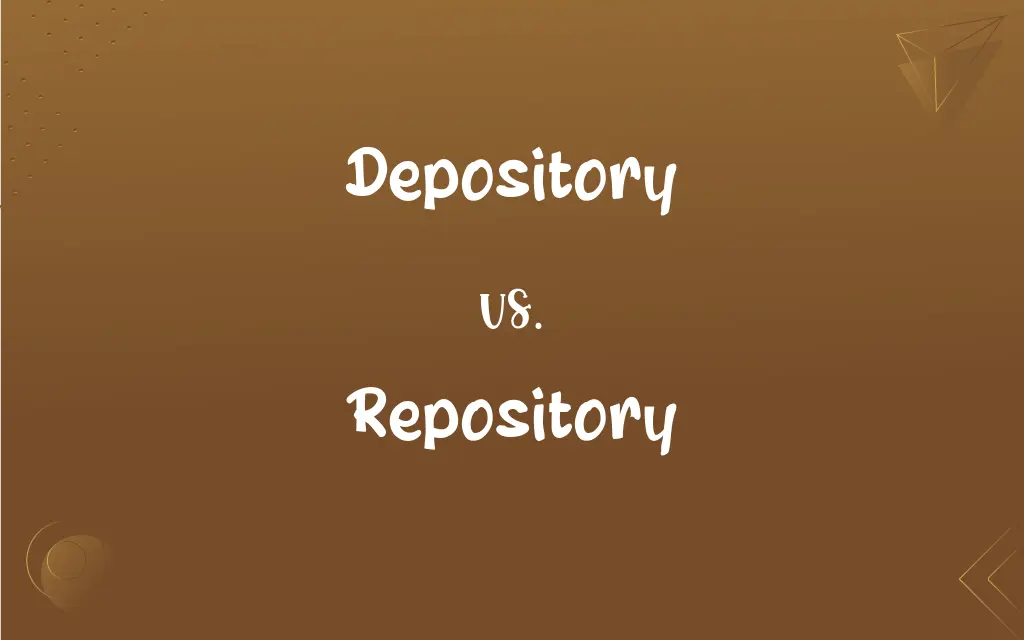Depository vs. Repository: What's the Difference?
Edited by Harlon Moss || By Janet White || Published on November 29, 2023
A depository is a place where items are stored or deposited, often for safekeeping. A repository is a place, physical or digital, for storing, organizing, and managing data or artifacts.

Key Differences
A depository primarily serves as a storage space for tangible items, such as documents, money, or valuables, emphasizing security and safekeeping. In contrast, a repository, while also used for storage, focuses more on the organization and accessibility of its contents, which can be physical or digital, like data or historical artifacts.
Depositories are commonly used in financial contexts, such as banks or safe deposit boxes, where physical assets are deposited for security. Repositories, however, are often associated with data and knowledge management, like code repositories in software development or archives in libraries.
Access to depositories is typically restricted and heavily controlled, given the value and sensitivity of the items stored. Repositories, however, while they may have access controls, often emphasize easier access and retrieval of information, focusing on the distribution and sharing of resources.
Examples of depositories include bank vaults, safety deposit boxes, and secure storage facilities. On the other hand, repositories manifest as digital libraries, codebases on platforms like GitHub, or museums preserving cultural artifacts.
In everyday language, "depository" implies a passive role of simply holding or keeping items, whereas "repository" often connotes active management and organization of the stored contents, reflecting a broader and more dynamic function.
ADVERTISEMENT
Comparison Chart
Primary Function
Safekeeping of physical items
Storing and organizing data or artifacts
Common Context
Financial and security (e.g., banks, safe deposits)
Information and data management (e.g., libraries, code)
Nature of Stored Items
Tangible assets like money, documents
Physical or digital, like data, code, historical items
Access and Security
Restricted access, high security
Controlled but easier access for information retrieval
Linguistic Connotation
Emphasis on storage and safety
Focus on management and accessibility of contents
ADVERTISEMENT
Depository and Repository Definitions
Depository
A place for safekeeping money or valuables.
The bank's depository held the town's gold reserves.
Repository
A place for storing and managing software code.
Developers used the repository to collaborate on the project.
Depository
A facility for storing important or confidential items.
The company's depository contained sensitive client documents.
Repository
A hub for systematic storage of information resources.
The online repository provided access to thousands of e-books.
Depository
A location where items are stored for protection.
He kept his heirlooms in a private depository.
Repository
A storage location for digital data or information.
The repository contained years of research data.
Depository
An area designated for holding specific items temporarily.
The library had a depository for returned books.
Repository
A center for collecting and preserving knowledge.
The university's repository had a vast collection of academic papers.
Depository
A unit or space used for storing goods or materials.
The museum's depository housed rare artifacts.
Repository
An archive for cultural or historical artifacts.
The national repository stored artifacts from ancient civilizations.
Depository
A place where something is deposited, as for storage or safekeeping; a repository.
Repository
A place where things may be put for safekeeping.
Depository
A place where something is deposited, as for storage, safekeeping, or preservation; a repository.
Repository
A warehouse.
Depository
A trustee; a depositary.
Depository library
Depository
A place where anything is deposited for sale or keeping; as, warehouse is a depository for goods; a clerk's office is a depository for records.
Depository
One with whom something is deposited; a depositary.
I am the sole depository of my own secret, and it shall perish with me.
Depository
A facility where things can be deposited for storage or safekeeping
FAQs
What is a depository used for?
A depository is used for storing physical items, often valuables, for safekeeping.
Can individuals access a depository?
Access to a depository is usually restricted and controlled for security reasons.
Are depositories always physical spaces?
Typically, yes, depositories are physical spaces like vaults or storage units.
What's an example of a digital repository?
GitHub, used for code storage and collaboration, is an example of a digital repository.
Is a museum a type of repository?
Yes, museums are repositories for cultural and historical artifacts.
Can a depository store electronic data?
Typically, depositories are for tangible items, but some may store electronic data.
Is a repository used for organizing content?
Yes, a repository not only stores but also helps in organizing and managing content.
Can a repository be digital?
Yes, repositories often refer to digital storage spaces for data or information.
Do libraries act as depositories?
Libraries can act as depositories for books and physical media.
Can a depository function as a repository?
While they have different primary functions, some depositories may serve repository-like roles.
Are repositories always open to the public?
Access varies; some are open to the public, while others have restricted access.
Can anyone create a digital repository?
Yes, with the right tools and software, individuals or organizations can create digital repositories.
Are repositories important for research?
Yes, repositories play a crucial role in storing and providing access to research data.
Is a safety deposit box a depository?
Yes, it's a type of depository for personal valuables and documents.
Is a warehouse considered a depository?
Yes, warehouses can be considered depositories for goods and materials.
Do repositories require special software?
Digital repositories often use specialized software for data management and access.
What security measures do depositories have?
Depositories typically have robust security measures like surveillance and locks.
Are there digital depositories?
The term is less common, but some digital platforms may function similarly to depositories.
How do repositories benefit academia?
They provide a centralized location for academic resources and research materials.
Do all repositories allow content editing?
It depends; some, like code repositories, allow editing, while others are more static.
About Author
Written by
Janet WhiteJanet White has been an esteemed writer and blogger for Difference Wiki. Holding a Master's degree in Science and Medical Journalism from the prestigious Boston University, she has consistently demonstrated her expertise and passion for her field. When she's not immersed in her work, Janet relishes her time exercising, delving into a good book, and cherishing moments with friends and family.
Edited by
Harlon MossHarlon is a seasoned quality moderator and accomplished content writer for Difference Wiki. An alumnus of the prestigious University of California, he earned his degree in Computer Science. Leveraging his academic background, Harlon brings a meticulous and informed perspective to his work, ensuring content accuracy and excellence.








































































